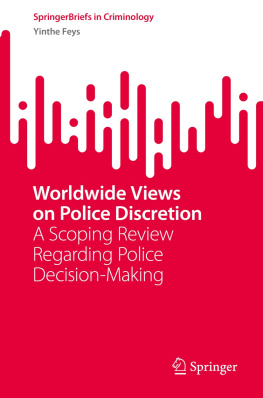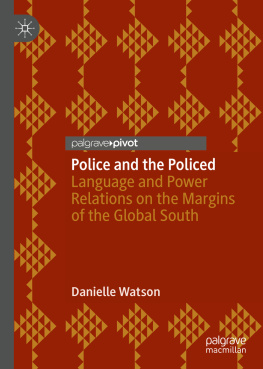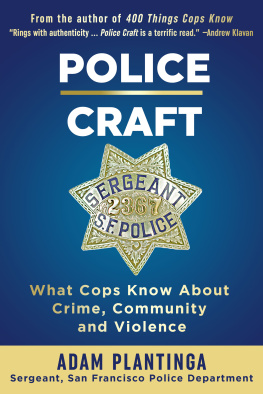Research Series The Laval Community - Police knowledge, political profiling and disinformation- the Montreal police and its GAMMA project
Here you can read online Research Series The Laval Community - Police knowledge, political profiling and disinformation- the Montreal police and its GAMMA project full text of the book (entire story) in english for free. Download pdf and epub, get meaning, cover and reviews about this ebook. year: 2022, genre: Politics. Description of the work, (preface) as well as reviews are available. Best literature library LitArk.com created for fans of good reading and offers a wide selection of genres:
Romance novel
Science fiction
Adventure
Detective
Science
History
Home and family
Prose
Art
Politics
Computer
Non-fiction
Religion
Business
Children
Humor
Choose a favorite category and find really read worthwhile books. Enjoy immersion in the world of imagination, feel the emotions of the characters or learn something new for yourself, make an fascinating discovery.
- Book:Police knowledge, political profiling and disinformation- the Montreal police and its GAMMA project
- Author:
- Genre:
- Year:2022
- Rating:5 / 5
- Favourites:Add to favourites
- Your mark:
- 100
- 1
- 2
- 3
- 4
- 5
Police knowledge, political profiling and disinformation- the Montreal police and its GAMMA project: summary, description and annotation
We offer to read an annotation, description, summary or preface (depends on what the author of the book "Police knowledge, political profiling and disinformation- the Montreal police and its GAMMA project" wrote himself). If you haven't found the necessary information about the book — write in the comments, we will try to find it.
Research Series The Laval Community: author's other books
Who wrote Police knowledge, political profiling and disinformation- the Montreal police and its GAMMA project? Find out the surname, the name of the author of the book and a list of all author's works by series.
Police knowledge, political profiling and disinformation- the Montreal police and its GAMMA project — read online for free the complete book (whole text) full work
Below is the text of the book, divided by pages. System saving the place of the last page read, allows you to conveniently read the book "Police knowledge, political profiling and disinformation- the Montreal police and its GAMMA project" online for free, without having to search again every time where you left off. Put a bookmark, and you can go to the page where you finished reading at any time.
Font size:
Interval:
Bookmark:

Police knowledge, political profiling and disinformation:
the Montreal police and their GAMMA project
Thesis
Pascal Dominique Legault
PhD in Sociology
Philosophi doctor (Ph.D.)
Quebec, Canada
Pascal Dominique-Legault, 2020
Police knowledge, political profiling and misinformation:
The Montreal police and their GAMMA project
Thesis
Pascal Dominique Legault
Under the direction of:
Andr C. Drainville, research director
Contributing to the sociological and criminological literature on the police in the context of crowds, on political profiling and police knowledge, this thesis presents an analysis of the construction and circulation of police knowledge relating to the establishment, in 2010, of the controversial GAMMA project (Watch for the activities of marginal and anarchist movements) of the Service de police de la Ville de Montral (SPVM). Our case study focuses specifically on constructed police knowledge that designates the crowd (designation modes), but also on those that designate GAMMA as a mode of police action. It provides a better understanding of how SPVM police knowledge was formed in the media, mainly in 2011, compared to how it was formed, internally, at the SPVM senior management level, between 2010 and 2011. he study takes shape from the analysis of the content of a press review (composed in particular of 36 journalistic articles, 20 press releases and 23 opinion letters) and a corpus of 55 internal SPVM documents obtained in deploying six access requests. In the end, the acquisition of this corpus required more than six years of legal and administrative proceedings under the Act respecting access to documents held by public bodies and the protection of personal information on documents.
Our investigation first proceeds to the analysis of the constructs present in the police media declarations which are regulated by the rhythm of events and societal reactions. Our study manages to raise more specifically the question of police denial. Our sociology of denial makes it possible to identify astonishing effects of certain publicly articulated police knowledge. In particular, we are seeing SPVM public relations efforts having the effect of (re)framing the discourse on GAMMA and directing the public's gaze away from certain GAMMA activities. Proceeding then with an analysis of the constructs laid down in internal strategic documents obtained under the Access Act, our study shows that far from being based solely on criminalizable events, the implementation of GAMMA draws more fundamentally from a problematization of the political marginality of social groups. We present how marginal movements are implicitly operationalized into visible indicators and how the problematization of specific political convictions and characteristics, far from indicators of criminality, amalgamates these movements with a criminal potential, urging GAMMA police officers to adopt attitudes of generalized suspicion towards them. The thesis explores the subjectivity of police knowledge on which is based the institutionalization, at the municipal level, of an additional police response that differentially targets these marginal and anarchist movements. It poses, without detour, the question of political profiling, but also questions sociological considerations relating to the theses of "strategic neutralization", "intelligent control", "normalization" and the "routinization" of the demonstration, as well as as landscapes of exclusion in the reflection on the power effects of the police knowledge studied. It also raises the question of conceptual mousetraps that can feed police imaginations. Tracing the circulation of problematic police knowledge to the internal documents of senior management, the study makes it possible to question the responsibility of the latter in the establishment of GAMMA and in a certain form of high-level political profiling. Our investigation also makes it possible to come back to the media framing of the social controversy which would have been ordered by the General Staff of the SPVM. A media framing that will have serious consequences since ultimately, according to our findings, it will have the effect of misinforming the public and hindering the fight against political profiling.
Keywords : police knowledge; political profiling, political discrimination; right to equality; monitoring, denials; denials; sociology of denial; disinformation; marginality; demonstrations; social movements; Quebec.
From this thesis stems a contribution to the ever-growing sociological and criminological research on protest policing, political profiling and police knowledge. It analyzes the construction and circulation of police knowledge in the context of the implementation of the controversial GAMMA project of the Montreal Police Department. Created in 2010, the project was intended to watch the activities of marginal and anarchist movements in the city of Montreal, Quebec (Canada). Our case study focuses on the constructed police knowledge that designate the crowd, but also GAMMA itself as a police mode of action. Our investigation enables us to better understand how police knowledge was constructed in the media, mainly in 2011, comparatively to how police knowledge was constituted internally, by Montreal Police Department's high commanding officers, between 2010 and 2011. Methodologically, our study builds on the content analysis of a press review (containing, amongst other material: 36 journalistic articles, 20 press releases and 23 opinion letters) and of a body of 55 internal documents produced by the Montreal Police Department. These internal documents were obtained via six access to information (ATI) requests sent through the provincial access to information process. These are the result of more than six years of legal and administrative procedures.
Our investigation starts by analyzing constructs in police public statements, oftentimes overdetermined by the rhythm of events and societal reactions. There we study more specifically denial font. Our sociology of denial uncovers surprising effects of certain police knowledge presented to the public. Amongst other things, we find public relations initiatives which (re)frame the narrative on GAMMA and redirect the public glance away from large sections of GAMMA's activities. Moving onwards, we apply analysis techniques to internal strategic documents obtained through ATI legislation. Our study shows that, far from dealing only with characteristics that may legitimately lead to criminalization, GAMMA's implementation fundamentally involved problematizing the political marginality of social groups. We show how characteristics of marginal movements were implicitly operationalized into visible indicators of possible criminality, as were specific political convictions and identity-related characteristics. These elements encouraged GAMMA officers to generalize their suspicion of members of marginal or anarchist groups. This thesis explores the subjectivity of the police knowledge used to institutionalize, on a municipal scale, a differential response targeting these specific movements. Straightforwardly, our study addresses the question of political profiling, but also sociological considerations pertaining to the concepts of " selective incapacitation " , " intelligent control " , " normalization " or " routinization " of protests and of " landscapes of exclusion " in our discussions on the power effects of the studied police knowledge. We also ponder on the " conceptual kettles " (or " conceptual kettling " ) which may nourish police imaginaries. Tracking the circulation of problematic forms of police knowledge up to high commanding officers, our study questions their responsibility in the implementation of GAMMA and in a type of high-ranking political profiling. Our investigation enables us to delve back into the mediatic framing of the controversy being itself carried out at the request of the police department's top brass. We conclude that these frames have heavy consequences for, we find ultimately, that they qualify as disinformation and have the effect of obstructing different struggles against political profiling.
Font size:
Interval:
Bookmark:
Similar books «Police knowledge, political profiling and disinformation- the Montreal police and its GAMMA project»
Look at similar books to Police knowledge, political profiling and disinformation- the Montreal police and its GAMMA project. We have selected literature similar in name and meaning in the hope of providing readers with more options to find new, interesting, not yet read works.
Discussion, reviews of the book Police knowledge, political profiling and disinformation- the Montreal police and its GAMMA project and just readers' own opinions. Leave your comments, write what you think about the work, its meaning or the main characters. Specify what exactly you liked and what you didn't like, and why you think so.












